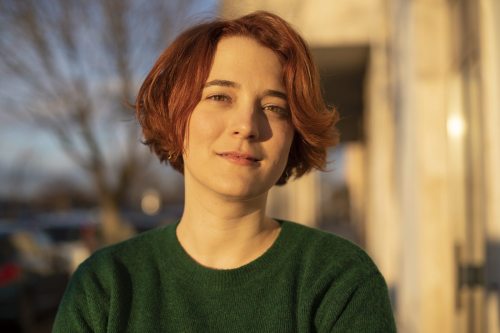Dear derms: Are my blackheads considered acne, or what?
There's lots of confusion over blackheads. Here, two derms answer what are blackheads and whether they're considered acne or not.

Lots of uninvited things can spring up on your face at any given time. In my personal facial real estate, I’ve had whiteheads, cystic acne, hormonal breakouts, a lady mustache, hyperpigmentation spots, and a stray chin hair or two (#blessup). The good thing is that I can identify these intruders so I can then quash them before they take over my face. Well, all of them except for one: blackheads.
I consider blackheads to be the most confounding skin situation, mainly because I’m not sure what the heck they are. Since whiteheads are a type of breakout, are blackheads acne too? Do you treat them like acne or stick with those nose strips to pull everything off your face? Where do they come from? Clearly I have a lot of questions about these elusive suckers, and I’m sure I’m not the only one.
So, I asked a dermatologist to help—excuse the pun— clear things up: “Basically, blackheads are a precursor of acne,” Shirley Chi, MD, a board-certified dermatologist in California, tells me. “It means that the pores are clogged and that debris is blocking the opening to the surface of the skin, which is a set-up for bacteria such as P. Acnes to grow.”
This Parisian Skincare Brand Is Launching in the United States for the First Time—Here’s What a Derm Wants You to Know

We’re Calling It: Cleansing Balms Are the Face Wash of the Future—Here Are 3 to Add to Your Cart

This Is the One Product That Scarlett Johansson Always Keeps in Her Purse and on Her Bedside Table

Since they’re the step right before getting acne, Dr. Dennis Gross, a New York dermatologist and founder of Dennis Gross Skincare, says they do classify as a form of it. “Blackheads are the first step in the chain of events that lead to acne, pimples, cysts, whiteheads, etc., and it represents a blockage in the pore,” he says. “So it’s a blockage of your oil gland. Sometimes it stops right there and you have blackheads, but some people go on to have real acne because the bacteria gets trapped behind the blockage and grows, which becomes a pimple.”
They get their color from bacteria on your skin (sexy). “Your skin has bacteria growing on its surface, including one particular type that then starts to ingest the oil being produced,” explains Dr. Gross. “When the oil is partially digested by the bacteria, it turns the oil the dark color. So the bacteria plays a role in how obvious the blackhead is.” Fascinating.
Leaving blackheads hangin’ in your nose or cheek area is like a siren’s call for more gunk and then an actual pimple. No thanks. To fight those suckers, the magic lies in exfoliation. “The key thing in terms of blackheads is to prevent the blockage,” says Dr. Gross. “To do that, you have to come at it in two different directions. One is that you need to exfoliate. Look for ingredients like AHAs [alpha-hydroxy acids] in a cleanser, for instance.” Dr. Chi recommends something with glycolic acid, for example. Think of blackheads as forming because your skin’s own oils are too heavy for its own good. “So instead of flowing like a liquid, it gets stuck like honey—so exfoliation loosens it up, dislodges it, cleans it out, and if you continue doing it, it’ll prevent you from having [blackheads],” says Dr. Gross.
Something else that can help with prevention and treatment? Sulfur. “Sulfur is really great as an antibacterial to prevent blackheads; it lowers the bacteria count,” says Dr. Gross. Or you can slather on a trusty retinol to keep things clear, too: “Apply a retinoid nightly to the area that’s prone to blockheads, such as the chin and nose,” says Dr. Chi. “These work to speed up the turnover of skin cells so that they slough off easier and don’t stay on the surface of the skin to clog up pores and lead to pimples.” Peels can help too, whether you’re using Dr. Dennis Gross Alpha Beta Peel pads ($88) on the reg or getting one at your derm’s office. And now you have more acne-fighting knowledge.
On a related note, here’s how to reduce your pore size. One thing that majorly helps? Learning how to chemically exfoliate your skin to keep everything nice and clear.
Sign Up for Our Daily Newsletter
Get all the latest in wellness, trends, food, fitness, beauty, and more delivered right to your inbox.
Got it, you've been added to our email list.







